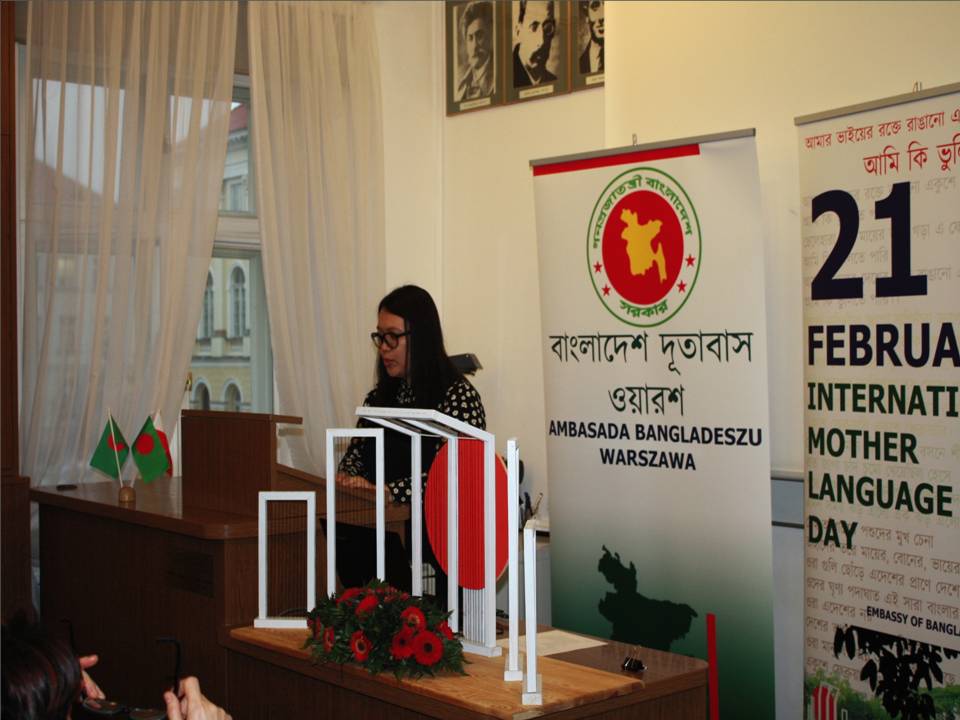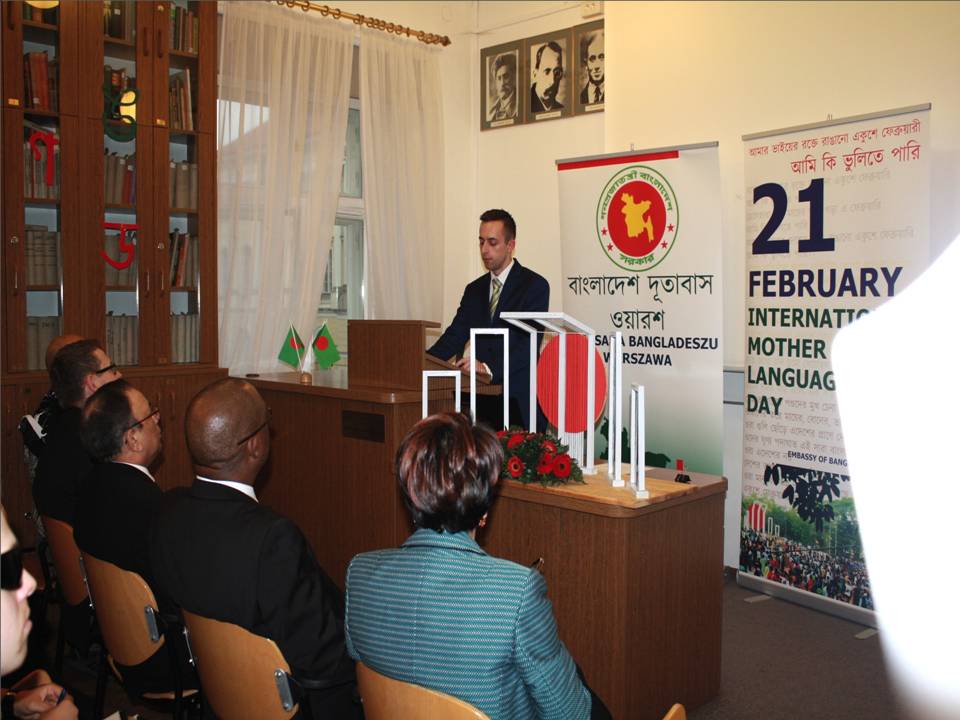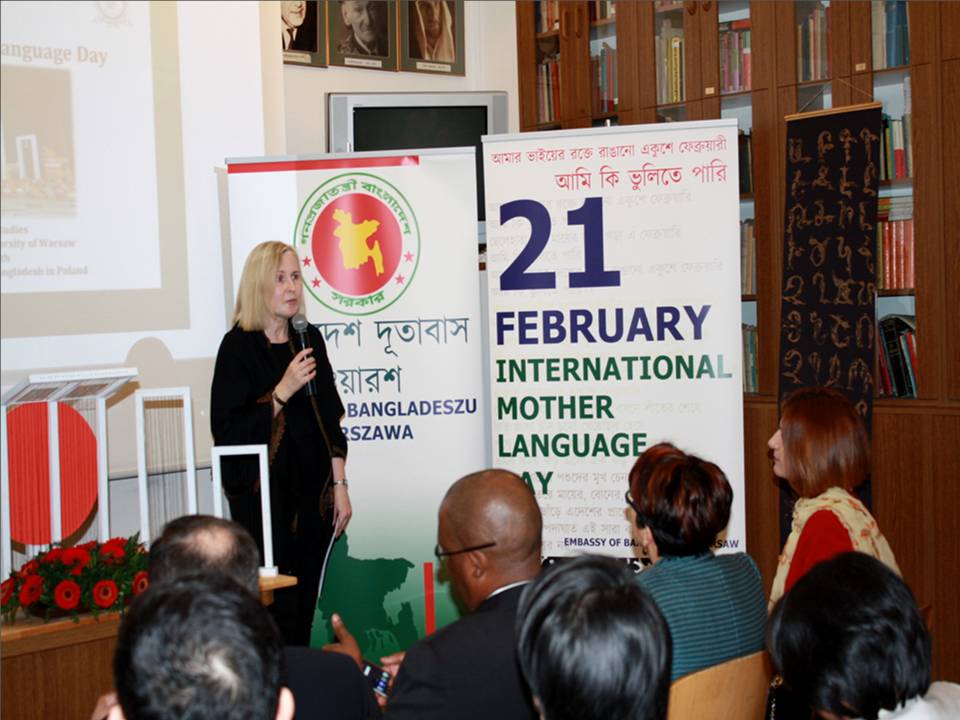Attache Ms. Evelyn L. Vega reading excerpts in PIlipino language of the epic poem entitled “Florante at Laura” written by the Father of
Pilipino Poetry” Mr. Francisco Balagtas during the International Mother Language Day held at the University of Warsaw
Assistant to the Philippine Ambassador for Economic and Cultural Diplomacy Mr. Oskar Groblewski gave a brief introduction about the epic poem and its author and read the English version of the excerpts from “Florante at Laura”
Ms. Anna Trynkowska, PhD Faculty of Oriental Studies of University of Warsaw explained the meaning of International Mother Language Day and
presented a short poem
The Philippine Embassy in Warsaw featured the epic poem “Florante at Laura” written by Francisco Balagtas during the celebration of the Inter-national Mother Language Day at the University of Warsaw on 01 March 2017.
The actual date for the celebration of the International Mother Language Day is every 21 February of the year and is one of the milestone events initiated globally by the UNESCO (United Nations Educational and Scientific Organization).
The Embassy’s Principal Assistant for Economic and Cultural Diplomacy Mr. Oskar Groblewski gave a short introduction about “Florante at Laura” and Francisco Balagtas. He also explained the importance of ‘Florante at Laura” to the Filipino people.
Mr. Groblewski said that “Florante at Laura” was written by Francisco Balagtas who is the Father of Pilipino Poetry and who studied Latin, Humanities and Law during college. He informed the audience that in real life, Balagtas and a certain Mariano Capule, who came from a landed wealthy family, were in love with the same woman. Capule wanted to eliminate his rival, Balagtas. Using his family’s wealth and power, Capule made sure that Balagtas would be sent to prison.
He also told the audience that Balagtas wrote Florante and Laura while he was in prison. He added that “although the setting of Florante and Laura was a foreign land, this epic poem resonated with Filipinos who considered it revolutionary because it was a reference to the oppression experienced by Filipinos under a foreign colonial government.”
Mr. Groblewski then recited excerpts from the epic poem, roughly translated in the English language, as follows:
“Within and beyond my forsaken land
Arrogance reigns
Goodness and kindness are being buried
Buried in the grave of suffering and pain
Good behavior is being tossed
Into the sea of scorn and contempt
The good are being buried
They are being interred without coffins
But the arrogant and the evil-hearted
Are being seated in the throne of praise
And the wicked beasts
Are being made to smell good with incense”
After his reading, Attache Mrs. Evelyn Vega recited the excerpts in Pilipino as follows:
“Sa loob at labas ng bayan kong sawi
Kaliluha’y siyang nangyayaring hari
Kagalinga’t bait ay ibinabaon
Ininis sa hukay ng dusa’t pighati
Ang magandang asal ay ipinupukol
Sa laot ng dagat kutya’t lingatong
Balang magagaling ay ibinabaon
At inililibing ng walang kabaong
Ngunit ay ang lilo’t masasamang loob
Sa trono ng puri ay iniluluklok
At sa balang sukab na may asal-hayop
Mabangong insenso ang isinusuob”
The event was hosted by the Faculty of Oriental Studies of the University of Warsaw, in cooperation with the Embassy of Bangladesh. The date 21 February is a pivotal date in the history of Bangladesh. On this date, four students were killed by security forces for actively advocating the use of their mother tongue, Bengali, in Bangladesh. Every 21 February, the people of Bangladesh “lay flowers at a Shaheed Minar (martyr’s monument); purchase glass bangles for themselves and female relatives; eat a festive meal and organize parties; and award prizes or host literary competitions.”
This year’s UNESCO celebration of the International Mother Language Day had the theme “Towards Sustainable Futures through Multilingual Education.” UNESCO Director General Irina Bokova said: “ Education and information in the mother language is absolutely essential to improving learning and developing confidence and self-esteem, which are among the most powerful engines of development.”
UNESCO declared: “To foster sustainable development, learners must have access to education in their mother tongue and in other languages. It is through the mastery of the first language or mother tongue that the basic skills of readoing, writing and numeracy are acquired. Local languages, especially minority and indigenous, transmit cultures, values and traditional knowledge, thus playing an important role in promoting sustainable futures.”
Other embassies which participated in this year’s celebration of the International Mother Language Day at the University of Warsaw were the embassies of Australia, Colombia, Thailand, Indonesia, South Africa, and Sri Lanka.




